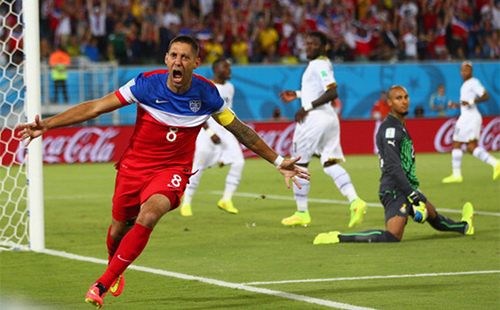
You had the feeling it was different this time. When Clint Dempsey drilled a shot past the Ghana goalkeeper merely 34 seconds into the U.S. World Cup opener on June 16th, you had the feeling it was different. This was soccer (futbol!), where a goal 34 minutes into a game is considered early. Then when a substitute player named John Brooks — John who? — converted a header in the 86th minute (that’s four minutes left to play, basketball fans), you knew that, yes, this was different. Soccer had arrived in the United States of America.
The Monday-night miracle drew a 7.0 overnight rating for ESPN, the highest such figure for a men’s soccer match in the 35-year history of the sports-media titan. Which means there are likely more Americans today who would pick John Brooks (John who?) out of a lineup than would recognize NBA Finals MVP Kawhi Leonard. Yes, an American soccer player more familiar than an NBA star. Something is different.
Americans are now demonstrating they can rally behind their national “futbol” team. Even if it means coming to grips with the emotional emasculation of Sunday’s heart-stopping tie with Portugal. (Are American fans to be thrilled the Yanks didn’t lose to the world’s fourth-ranked team Sunday? Or devastated that they didn’t beat a Portugal squad they led after 89 minutes of a 90-minute game?)
I played high school soccer, my last season 1986, shortly after Diego Maradona led Argentina to the World Cup championship. At that time, the United States had not even qualified for the quadrennial event since 1950. Those teammates of mine who could identify the colors of one national team or another were in the know. My use of Azzurri in referring to the Italian national team was positively elitist. (I spent a year in Turin as a boy. I’d felt the power of European futbol before I could describe it.) Soccer was a part of the fall season in Vermont, but when the high-school playoffs ended in October, that was it.
Then the U.S. (barely) qualified for the 1990 World Cup. And Major League Soccer was born (in 1996), bringing at least the idea of homegrown soccer stars to a country where “Soccer Mom” had grown to the proportion of a political demographic. (Raise your hand, Super Bowl viewers, if you know when the MLS Cup is played.) American soccer’s biggest boost to date — at least until John Brooks’s header — came in 1999, when the U.S. women’s team, featuring Mia Hamm, Memphian Cindy Parlow, and the jersey-tossing Brandi Chastain, won the distaff World Cup and were named “Sportswomen of the Year” by Sports Illustrated. My first daughter was born two months before Chastain converted her Cup-winning penalty kick. With my trips to the Mike Rose Soccer Complex now approaching three figures, I have two daughters as evidence something is different — and growing — on the soccer pitch in America.
Here’s one theory on why American sports fans generally can’t name five of the 19 teams in MLS: there are 122 “major league” teams in baseball, the NFL, the NBA, and the NHL, and taken together, these clubs play on every last day of the calendar, save the two before and after baseball’s All-Star Game. Where is the time to devote oneself to Sporting Kansas City? (Be careful with this suggestion in Seattle, where the Sounders average more than 40,000 fans per game.) But when the World Cup arrives — four years is enough time to miss something — we can indeed rally our support for a single soccer club in red, white and blue.
It would be sacrilege to compare a modern team to the 1980 U.S. Olympic hockey team and its famous “Miracle on Ice” at Lake Placid. But consider how few countries compete in hockey, relative to soccer. (There were but 12 hockey teams at the Olympic tournament this year in Russia.) More than 200 nations are desperate to earn one of 32 slots in soccer’s World Cup. When or if a U.S. team wins this hallowed trophy, it may be the last time America can be considered a victorious underdog … and there will be happy riots in streets from Seattle to Boston.